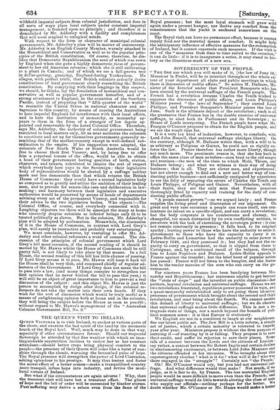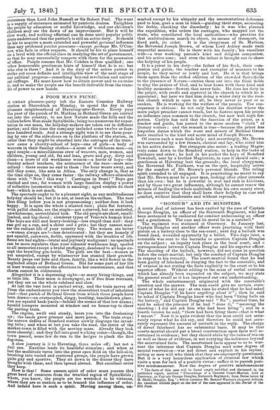SOVEREIGNTY OF THE PEOPLE.
" THE first use which you will make of it, [the law of June 19,] Monsieur le Prefet, will be to interdict throughout the whole ex- tent of your department all clubs and public meetings in which there is discussion of public affairs." So writes M. Dufaure, Mi- nister of the Interior under that President Bonaparte who has been elected by the universal suffrage of the French people. The French had a revolution because Charles the Tenth wished to suppress the discussion of public affairs, and Louis Philippe's Minister passed "the laws of September "; they ousted Louis Philippe, and President Bonaparte's Minister passes the law of June. Such is the ultimate deposit of the revolution ; such is all the guarantee that France has in the double exercise of universal suffrage, to elect both its Parliament and its Sovereign ; no House of Lords interposing. The French people have what Mr. Feargus O'Connor proposes to obtain for the English people, and we see the result thus far. " THE first use which you will make of it, [the law of June 19,] Monsieur le Prefet, will be to interdict throughout the whole ex- tent of your department all clubs and public meetings in which there is discussion of public affairs." So writes M. Dufaure, Mi- nister of the Interior under that President Bonaparte who has been elected by the universal suffrage of the French people. The French had a revolution because Charles the Tenth wished to suppress the discussion of public affairs, and Louis Philippe's Minister passed "the laws of September "; they ousted Louis Philippe, and President Bonaparte's Minister passes the law of June. Such is the ultimate deposit of the revolution ; such is all the guarantee that France has in the double exercise of universal suffrage, to elect both its Parliament and its Sovereign ; no House of Lords interposing. The French people have what Mr. Feargus O'Connor proposes to obtain for the English people, and we see the result thus far.
It is a very lax kind of induction, however, to conclude, with Lord John Russell, that universal suffrage abridges liberty. On the contrary, although M. Dufaure writes thus, with a will to be as arbitrary as Polignac or Guizot, he could not so rigidly en- force the law. France therefore has rather more liberty, though not much more. The proximate reason is, that she has back in office the same class of men as before—men bred to the old usages and routines—the men of the class to which Mole, Thiers, and Dufaure belong ; and what we witness is their way of doing business : that is all. They are clever men, and experienced; but not clever enough to find out a new and better way of con- ducting public business—not sufficiently castigated by experience to see the folly of repeating the errors of Charles the Tenth and Louis Philippe, of Polignac and Guizot. Nevertheless, with all their faults, they are the only men that France possesses thoroughly fitted by capacity and training for the duty of con- ducting public affairs.
"A people cannot govern "—so we argued lately ; and France supplies the living proof and illustration of our argument. On great and very rare occasions a people can rouse itself, can con- centrate its intent on a specific object, and can carry a revolution; but the body corporate is too cumbersome and clumsy, too changeful, too much distracted by its own conflicting notions, to persevere with the task of exercising the sovereign power : it can- not remain constantly in presence : it falls back to its original apathy ; leaving power to those who have the audacity to seize it, government to those who have the capacity to carry it on. Ledru-Rollin and Lamartine had the audacity to seize power in February 1848, and they possessed it ; but they had not the ca- pacity to carry on government, so that it slipped from them to Cavaignac, and, by a continued recoil of the balance, through him to Louis Napoleon and Dufaure. Ledru-Rollin appeals to France against the transfer; but the brief hour of popular action has passed : France will not listen to the bungler, and she leaves him to the tender mercies of the men who can carry on the go- vernment.
For nineteen years France has been bandying between Mo- narchy and Republicanism ; her statesmen unable to get beyond the "state of siege" and the interdict on public discussion—her patriots, beyond revolution and universal suffrage. Hence we see two revolutions frustrated, republican power possessed in vain, and a quasi-monarchy reestablished only to set going those identical processes of government which brought about the second and third revolutions, and must bring about the fourth. We cannot ascribe this default of liberty to universal suffrage; but we do observe that universal suffrage makes little difference. This is not a re- trograde state of things, nor a march beyond the bounds of poli- tical common sense : it is that Europe is stationary.
We English are not in a condition to laugh at our neighbours. See our latest public act. The Jew Bill is a little reform, a simple act of justice, which a certain minority is tolerated to impede year after year. Ministers propose it without the firm purpose of carrying it—of standing by it or falling. They propose it to save i their credit, and suffer its rejection to save their places. Some talk of a contest between the Lords and the citizens of London : say rather, a contest between Sir Robert Inglisand certain dealers in electioneering excitement, or between Lord John Manners and the citizens offended at his intrusion. Who brought about this supererogatory election ? what is it for ? what will it do ? who was, there engaged in the " struggle"? Certainly not " the People.'
Oh! Mr. O'Connor would cry, but you had not universal suf- frage. And what difference would that make ? Not much, if we judge, as it is fair to do, by France. The less mercurial English people would be more difficult to move even than the French; and universal suffrage would do little towards altering the class of men who supply our officials—nothing perhaps for the better. We doubt whether Mr. O'Connor or Mr. Hume would make a better statesman than Lord John Russell, or Sir Robert Pee]. The want is a supply of statesmen animated by patriotic desires. Enlighten the people by education or useful knowledge, and our children's children may see the dawn of an improvement. But it will be slow work, and nothing effectual can be done until popular politi- cians understand that the patriot's is still an active duty. It should be his to acquire a more extended and powerful personal influence than any professed patriot possesses—except perhaps Mr. O'Con- nor, who fails in other respects. It should be his to place himself on a level with the official class in studying the art of government, so that he may successfully compete with them for the possession of office. People assume that Mr. Cobden is thus qualified ; one other honourable gentleman hints of himself that he is so : but who else is there ? And it is the duty of the active patriot to strike out some definite and intelligible view of the next stage of our political progress—something beyond revolution and univer- sal suffrage. He must know how to obtain power and to exercise it, and to make the people see the benefit derivable from the trans- fer of power to new hands.

























 Previous page
Previous page